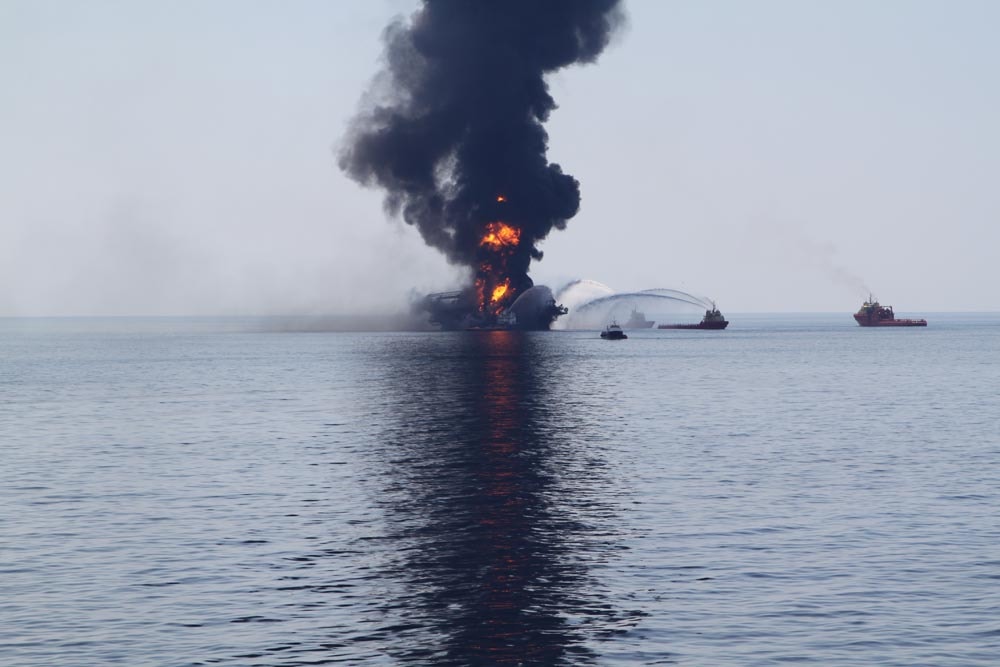As the oil spill in the Gulf of Mexico continues, with 210,000 gallons of oil leaking into the waters each day (an estimated 3.5 million gallons spilled so far), all the parties connected with the Deepwater Horizon rig try to blame each other for the disaster, hours before a senate hearing is scheduled to take place.
BP America, the owner of the well, Transocean Ltd., the owner of the rig and Halliburton, a contractor of Deepwater Horizon have begun taking on each other over whose to blame for the April 20 explosion.
BP, who says it lost so far $350 million in response, containment, relief well drilling and other costs, says Transocean owned the blowout preventer which caused the explosion.
"The systems are intended to fail-closed and be fail-safe; sadly and for reasons we do not yet understand, in this case, they were not," Lamar McKay, BP rep., was quoted as saying by Miami Herald. "Transocean's blowout preventer failed to operate."
Transocean on the other hand says that's not the case, as their investigative team found the blowout preventer to be "clearly not the root cause of the explosion." Transocean points instead to the casing and cement with which Halliburton sealed the well.
The circle of blame is closed by Halliburton, which points back to BP as the culprit. As the owner of the well, BP is the one saying what and how, and Halliburton needs to comply.
"Halliburton, as a service provider to the well owner, is contractually bound to comply with the well owner's instructions on all matters relating to the performance of all work-related activities."
Amidst the fight to find the culprit, the spill continues. Several attempts have been made to contain it and all have failed so far. The current course of action, which calls for two relief wells to plug a leak on the seabed of the Gulf of Mexico, has sparked fears of an even bigger spill.
“It’s potentially the case that you’d see a larger volume of oil because in effect you’re puncturing two holes rather than one hole,” Fred Aminzadeh, a research professor at the University of Southern California warned in an interview with Business Week.
BP America, the owner of the well, Transocean Ltd., the owner of the rig and Halliburton, a contractor of Deepwater Horizon have begun taking on each other over whose to blame for the April 20 explosion.
BP, who says it lost so far $350 million in response, containment, relief well drilling and other costs, says Transocean owned the blowout preventer which caused the explosion.
"The systems are intended to fail-closed and be fail-safe; sadly and for reasons we do not yet understand, in this case, they were not," Lamar McKay, BP rep., was quoted as saying by Miami Herald. "Transocean's blowout preventer failed to operate."
Transocean on the other hand says that's not the case, as their investigative team found the blowout preventer to be "clearly not the root cause of the explosion." Transocean points instead to the casing and cement with which Halliburton sealed the well.
The circle of blame is closed by Halliburton, which points back to BP as the culprit. As the owner of the well, BP is the one saying what and how, and Halliburton needs to comply.
"Halliburton, as a service provider to the well owner, is contractually bound to comply with the well owner's instructions on all matters relating to the performance of all work-related activities."
Amidst the fight to find the culprit, the spill continues. Several attempts have been made to contain it and all have failed so far. The current course of action, which calls for two relief wells to plug a leak on the seabed of the Gulf of Mexico, has sparked fears of an even bigger spill.
“It’s potentially the case that you’d see a larger volume of oil because in effect you’re puncturing two holes rather than one hole,” Fred Aminzadeh, a research professor at the University of Southern California warned in an interview with Business Week.

